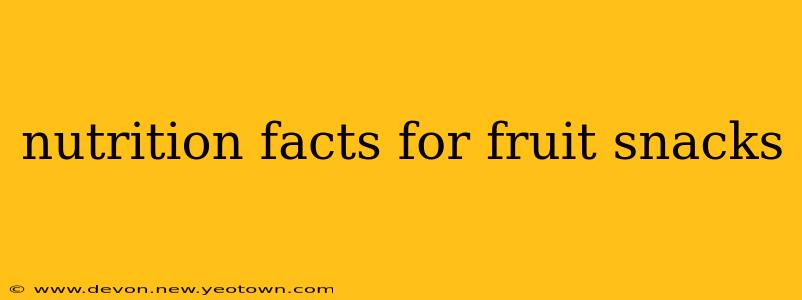Fruit snacks. Those chewy, colorful delights that often grace lunchboxes and after-school treats. But beyond the sugary sweetness and vibrant hues lies a nutritional landscape that’s worth exploring. This isn’t just about calories; it's about understanding what you're feeding yourself and your family, making informed choices, and navigating the often-confusing world of nutrition labels. Let's unravel the mysteries behind those fruit snack nutrition facts.
What are the typical nutritional components of fruit snacks?
The nutritional profile of fruit snacks varies wildly depending on the brand and specific product. However, some common components typically found include:
-
Sugars: This is often the most prominent component. Many fruit snacks rely heavily on added sugars to achieve their sweetness and texture. These sugars can contribute to energy crashes and potential health concerns if consumed in excess. Look carefully at the “added sugars” line on the nutrition label – you might be surprised!
-
Carbohydrates: Fruit snacks are primarily composed of carbohydrates, a major source of energy for the body. However, the type of carbohydrate matters. Many fruit snacks contain refined carbohydrates, which are quickly digested and can lead to blood sugar spikes.
-
Vitamins and Minerals: Some brands fortify their fruit snacks with vitamins and minerals like Vitamin C or Vitamin A. However, the amounts may be minimal, and relying solely on fruit snacks for your daily micronutrient intake isn't recommended.
-
Fruit Juice Concentrates: While the name suggests a significant fruit component, the amount of actual fruit in many fruit snacks is surprisingly low. Fruit juice concentrates often contribute to the sweetness and color but may not provide the same level of nutritional benefits as whole fruits.
-
Artificial Colors, Flavors, and Preservatives: Many fruit snacks contain artificial ingredients to enhance their appearance, taste, and shelf life. While generally considered safe in moderation, some individuals may have sensitivities to these additives.
How many calories are in a typical serving of fruit snacks?
Calorie counts in fruit snacks range considerably. A typical serving size (often around 1 ounce) might contain anywhere from 80 to 150 calories, though some larger pouches pack far more. It's crucial to check the label for the specific calorie count, as it's highly dependent on the brand and the size of the serving.
What are the health benefits (if any) of fruit snacks?
Let's be honest: the health benefits of fruit snacks are often overshadowed by their less-desirable aspects. While some may contain added vitamins and minerals, the high sugar content and lack of substantial fiber often outweigh any potential advantages. For a genuinely healthy snack, choosing whole fruits is always a better option.
Are fruit snacks a good source of fiber?
Generally, no. Fruit snacks tend to be low in fiber. Fiber is essential for digestive health and can help you feel fuller for longer. If you're looking for a fiber-rich snack, you're much better off grabbing a piece of fruit, a handful of berries, or a serving of vegetables.
Are fruit snacks suitable for children?
Fruit snacks can be part of a balanced diet for children in moderation, but should not be a daily staple. The high sugar content poses risks like increased weight gain, dental problems, and potential hyperactivity. Prioritize whole fruits, vegetables, and other nutrient-rich snacks as the primary choices for your children. Fruit snacks can be an occasional treat, but not a regular part of their diet.
How can I choose healthier fruit snack options?
If you're looking for a healthier choice, pay close attention to the nutrition label. Look for options with:
- Lower added sugar: Choose brands with the lowest amount of added sugar per serving.
- Higher fruit content: Look for products with a higher percentage of real fruit juice or whole fruit.
- Fewer artificial ingredients: Opt for options with fewer artificial colors, flavors, and preservatives.
- More vitamins and minerals: While not a primary concern, some brands fortify their fruit snacks with extra vitamins and minerals.
Ultimately, while fruit snacks can provide a quick burst of sweetness, they shouldn't be the foundation of a healthy diet. Whole fruits, vegetables, and other nutrient-rich foods offer far greater nutritional value and contribute to overall well-being. Consider fruit snacks a rare indulgence, not a dietary cornerstone.

